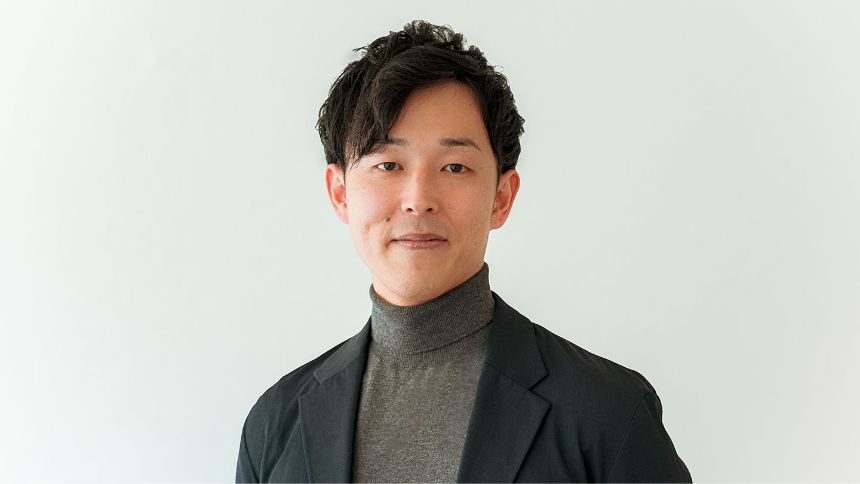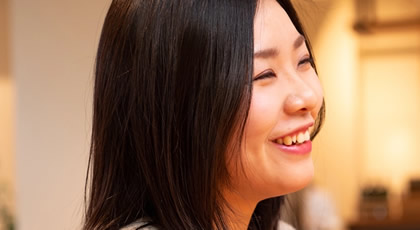
When Honesty Pays Off: Building Democratized Future Through Tech
In September 2024, a new engineer joined TYPICA’s product team that’s developing the New Model, the company’s latest online platform. Her name is Shiori Arai, and she came on board through a referral from Executive Officer Kosuke Arisawa. The two aren’t strangers. They previously worked together for about three years on the same team at Raksul, and they’re also friends who enjoy gaming together outside of work.
With a degree in Information Science from the University of Tsukuba, Arai has spent over a decade as a web engineer, driven by her desire to make a difference in the world through web systems. Now, as she embarks on her first venture into the startup world, what thoughts and motivations does she bring to this new endeavor?

Questioning what happiness really means
“Are you happy right now?”
During her job interview, TYPICA’s CEO Masashi Goto, who was talking about the poverty faced by coffee producers, casually posed this question to Arai. She couldn’t get it out of her mind. Perhaps because she was in her mid-thirties, a time when she was reevaluating how she wanted to live her life moving forward. Even as she explored other job prospects, that question lingered in a corner of her mind.
“Sure, I knew as a matter of knowledge that many people around the world suffer from poverty and hunger, and that fair trade is practiced to reduce economic inequality. But since I’ve lived my whole life in Japan, I’ve never really felt it deeply. So it was a wake-up call. There’s some truth to the idea that just improving Japan doesn’t make the world a better place.
Actually, TYPICA is developing business globally and can tackle various social problems. I was attracted to how everyone there believes in that and acts on it.”
Since her days as a fresh graduate, Arai had always wanted to steer the world in a positive direction through web systems. Her previous job at Raksul, where she spent five and a half years, was where she had her most impactful experiences.
Raksul, with its vision that “Better Systems, Better World,” operates a sharing platform for printing and customer acquisition support. It offers small- to mid-sized businesses and sole proprietors, who may lack resources like capital and talent, the chance to easily and affordably create high-quality printed materials, helping them grow and expand their businesses.
“The way TYPICA promotes direct trade is similar to Raksul’s business model. Even small farms operated by families can distribute their coffee under their own name and build a fanbase. The more TYPICA serves as a bridge for transparent relationships between producers and roasters, the more it benefits. I was drawn to that way of doing things.”

Stepping out of my comfort zone
Meanwhile, Raksul and TYPICA are in very different growth phases. Raksul had a solid foundation and was entering an expansion stage, whereas TYPICA is just beginning to establish its groundwork. Before Arai decided to join, Arisawa cautioned her that working at TYPICA would be “pretty chaotic,” with many team members lacking experience in collaborative development, meaning there was plenty to do. But she took it positively.
“Comparing phases, if Raksul was about scaling from 10 to 100 or 100 to 1,000, then TYPICA is at 1 to 10. The new platform (New Model) has just launched and there is a lot that’s incomplete. That excites me because there are plenty of areas where I can contribute, whether it’s sharing my expertise or introducing systems to streamline operations in collaboration with other divisions.
Having been someone who wasn’t originally ‘native’ to IT, I hope to bridge the gap so that even people without specialized knowledge can make use of technology. This is a fresh challenge for me because I’ve typically worked with those who share similar backgrounds and jargon. I felt the urge to use my skills and experiences in a wider world.
Though TYPICA is known as an innovative startup in the coffee world, many in the IT sector haven’t heard of it. I want to contribute to the company’s growth and an eventual IPO by developing an interesting platform and services that also attract attention from IT professionals.”
Interestingly, Arai had chances in the past to get involved with startups. Before she decided to join Raksul, a college senior invited her to launch a startup with them. She was tempted by that offer, but when she reflected on where she was in her career, she couldn’t help but be cautious. Thinking that she was still inexperienced and wouldn’t be a strong asset, these inner doubts distanced her from risky challenges.
“I recognized that my specialty was taking something that has already taken shape, formatting it, and spreading it for wider use. With that in mind, I believed I could be helpful at Raksul during its expansion phase, given that its business model and working styles were already well-defined.
On the flip side, I didn’t have a clear image of how I could contribute at a company in a phase like TYPICA’s. That’s why I was seeking opportunities that would allow me to grow and add more tools to my toolkit. But my mindset changed after I connected deeply with TYPICA’s vision. I thought it’d be a shame to pass up the opportunity to do what I really want to do just because I’m unsure about my aptitude or because the organization isn’t fully structured.”

Making an impact with IT
It was in elementary school, around grades four or five, that Arai, a self-proclaimed “nerd who loved internet surfing and reading,” started accessing the web via Windows XP. Whenever she came across an unfamiliar term, she’d look it up, which would lead to even more new words. She could lose herself for hours, immersed in the boundless sea of the internet that continuously opened up new worlds.
By the time she reached junior high school, Arai began building relationships with people online. She felt proud and slightly more mature when she went to arcades with high school and university girls she’d met in text chats. It was also refreshing for her to be treated as an equal, rather than being labeled merely as a “junior high school girl.”
“It’s not that I had a tough time at school or was unhappy with who I was, but I think I used to see the online world and the real world as entirely separate. Once I started my career and understood that there are real people behind the internet, I think the line between online and reality started to disappear for me.”
Arai’s teenage years in the 2000s coincided with IT’s rapid integration into everyday life. Social networks like mixi and Twitter enabled connections across languages and locations, and ground-breaking web services could make tasks overwhelmingly efficient. Believing in IT’s potential to guide the world toward a better future, she decided to study information science at the University of Tsukuba to gain the skills and knowledge needed as an IT engineer.
But obstacles awaited her. Surrounded by students who had self-taught programming skills or were gaining hands-on experience by interning at startups, Arai couldn’t help but feel inferior. It was as if a hobbyist English learner were placed among native speakers. Those four years of uncertainty about her ability to thrive in this field led Arai to opt for a path of diligently accumulating experience and expertise.

Upon graduation, Arai started at an SIer (Company A) that focused on commissioned development, where she engaged in web app creation. She frequently saw how introducing web systems could eliminate inefficient practices typical of traditional Japanese businesses – like endless rounds of stamping documents – resulting in rapid efficiency improvements. That allowed her to experience the potential of digital transformation firsthand.
After becoming interested in in-house service development at Company A, she moved to a company creating SaaS products for hotels (Company B), where she spent about two years. There, she worked across all areas, from front-end to back-end and infrastructure. She went on to join Raksul, seeking to work with more specialized professionals on larger-scale projects. She believed that the B2B domain had significant room for IT-driven efficiency improvements and that automating processes could greatly impact society and individuals.
It was at Raksul that she met Arisawa. At the time, Arisawa was working solo on a project to build a data-checking foundational system applicable across multiple e-commerce sites. Arai joined the team, and together they automated parts of the process from order placement to delivery of printed materials. This greatly improved productivity and profitability alongside growth in both customer numbers and sales.
“Working on that core system was my biggest achievement as an engineer. Raksul has great UX, like being able to view print previews and accurately track the delivery timeline. I believe we provided real value for customers using the company’s services.”
Arisawa says, “Arai-san and I are on the same wavelength and can communicate smoothly. And she’s accustomed to B2B business. With her management background and the experience she gained at a startup (Company B), she’s a valuable asset. Plus, her bright and friendly personality makes her great to work with. So when I heard she was leaving Raksul, I reached out immediately. At TYPICA, she’s been vigilant about the finer details, proactively setting rules and enhancing workflow efficiency, which has been a huge support.”

Thriving together
The internet can magnify both positive and negative forces to scales beyond our control. Technology isn’t inherently guilty; it depends on the ethical standards of those who create and use it. However, in a disorderly world, evil tends to flourish, prompting the introduction of legal restrictions. This leads to situations where those who are earnest and sincere often end up at a disadvantage – a pattern seen throughout history and across various sectors.
For this reason, Arai has made it a point not to involve herself professionally with businesses that stimulate users’ gambling instincts for profit or industries where everyone competes to take profits from one another in a zero-sum game, because she doubts whether it’s worth investing her precious energy in such services.
Looking at it differently, this reflects how the internet has promoted democratization in many areas. In business, the internet has opened up opportunities for those without funds or fame – like small and medium-sized companies and individuals – significantly enhancing their potential to seize opportunities.
“I believe that even if resources are limited, it’s better to live in a world where you can run a business that’s the right size for you and be happy. Platform companies are sometimes seen as bad guys who profit by taking fees, but at least Raksul was about mutual prosperity.
I believe TYPICA is similar. If the goal is to earn money efficiently, there are better business models. At my core, I want to help build a democratized world where anyone can access opportunities, not restricted by titles, attributes, or whether they hold power or wealth.”

Honesty should be rewarded, not punished
The source of Arai’s mindset can be traced back to a phrase her mother would often tell her: “Honest people like you and me end up being taken advantage of and losing out.”
Arai’s mother was a capable woman working part-time while being a homemaker. Despite her efforts to foresee issues, prevent problems, and solve challenges at her workplace, she received no recognition or pay raise. Yet, believing that others would be troubled if she didn’t step in, she couldn’t just look the other way. Her internal conflicts often transformed into grievances.
In the background was her past – though she had worked in a comprehensive role at a major insurance company, she had to resign upon marriage and childbirth to become a homemaker. Now that her children have flown the nest, she works as a temporary staff member, but her experience and achievements in part-time clerical positions aren’t acknowledged. Originally, she loved work and was highly capable, so she likely carried lasting feelings of frustration and helplessness about not being able to utilize her skills.
Possibly because she didn’t want her daughter to go through the same, when high school-aged Arai stayed up late every night working on group assignments, her mother often asked, “Do you really have to be the one doing all that?” Remembering how she accepted the role of class president in elementary school – despite not wanting it – because she couldn’t stand the heavy atmosphere in her class, Arai realizes she might have a tendency toward such behaviors.
“Just because she said honest people end up losing doesn’t mean I thought I shouldn’t do what needed to be done – I couldn’t think that way. Maybe in the short term, I’m at a disadvantage, but if I believed it would benefit me in the long run, I was okay with it. Even at work, if I suggest solutions to problems I’ve found and no one agrees, I have to do it myself, even if it’s extra effort I don’t have to take on.
That’s why I started wishing for a society where honest people don’t have to lose out, a world where those doing the right things are rewarded. By helping people who are tackling tough or unprofitable challenges and achieving results, maybe I feel that people like my past self and my mother are also being rewarded.”























